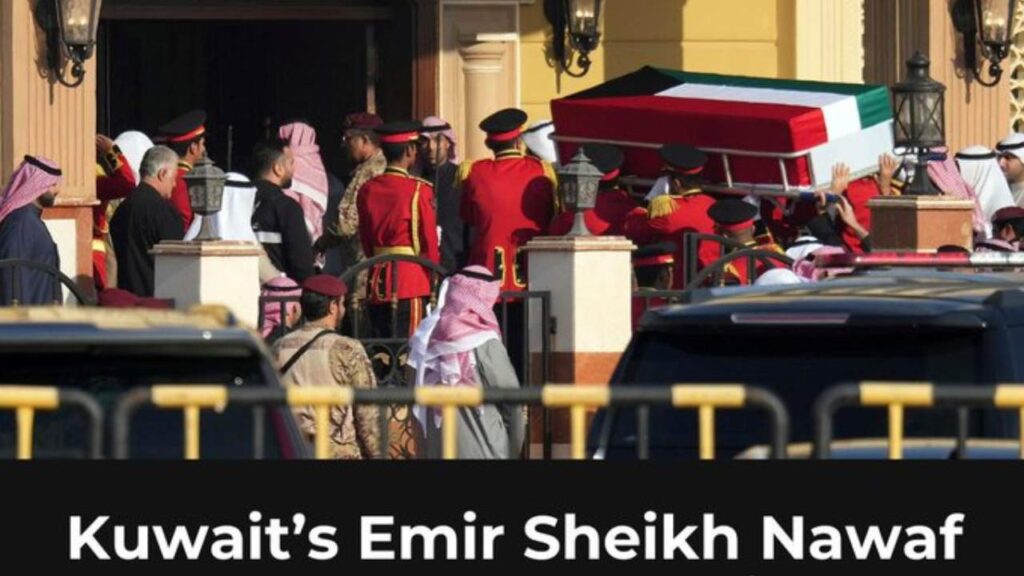Kuwait Emir
The Gulf state of Kuwait is shrouded in a sombre atmosphere as foreign dignitaries from around the globe arrive to offer their condolences and pay respects after the demise of Emir Sheikh Nawaf al-Ahmad al-Sabah. This poignant moment marks the end of an era and the beginning of a new chapter as Sheikh Meshal al-Ahmad al-Sabah, 83, assumes the role of emir after the passing of his half-brother. As leaders gather to express solidarity and sympathy, the geopolitical significance of Kuwait’s role in the Gulf region takes centre stage.
The Passing of Kuwait Emir Sheikh Nawaf

The news of Emir Sheikh Nawaf’s passing has left the nation in mourning. A veteran in public service with a six-decade-long career, Sheikh Nawaf held key positions such as minister of defense and interior during his illustrious tenure. The late emir was buried in Sulaibikhat cemetery, with prayers at the Bilal bin Rabah mosque. The cause of his death, at the age of 86, remains undisclosed, leaving the nation in reflection of his legacy as a consensus-builder and advocate for unity.
Policy Continuity and Expectations
With Sheikh Meshal assuming the mantle of leadership, expectations for policy continuity are high. As the de facto ruler since late 2021 due to Sheikh Nawaf’s ailing health, Sheikh Meshal is anticipated to uphold key Kuwaiti foreign policies. These include support for Gulf Arab unity, alliances with Western nations, and maintaining strong ties with Riyadh. Kuwait, as an OPEC oil producer with the seventh-largest oil reserves globally, plays a pivotal role in shaping regional dynamics.
Geopolitical Significance
Kuwait’s proactive and constructive ties with Iraq and Iran have been crucial in navigating regional disputes. As leaders from neighbouring Gulf states, including Qatar and Bahrain, express their condolences, the geopolitical landscape is under scrutiny. Kuwait’s historical relationship with Iraq, marked by the invasion and occupation in 1990, and ongoing maritime border disputes with Iraq and Iran add layers of complexity to the region’s dynamics.
International Leaders Offer Condolences
A procession of international leaders converges in Kuwait to offer condolences and express solidarity. Among them are Saudi Arabia’s Crown Prince Mohamed bin Salman, U.S. Defense Secretary Lloyd Austin, Jordan’s King Abdullah, and Egypt’s President Abdel Fattah al-Sisi. The presence of such influential figures underscores the global significance of Kuwait and the respect accorded to the late emir.
Palestinian Authority President Mahmoud Abbas’s meeting with Sheikh Meshal highlights Kuwait’s unwavering support for the Palestinian cause. This reaffirms Kuwait’s role as a staunch advocate for justice and solidarity on the international stage.
Legacy of Sheikh Nawaf
Sheikh Nawaf’s three-year reign, though relatively short by Kuwaiti standards, left an indelible mark. As a consensus-builder, he worked to mend strained relationships between parliament and government. His pardoning of dissidents and critics showcased a commitment to inclusivity and reform. The late emir’s legacy sets a benchmark for Sheikh Meshal as he steps into a leadership role during a crucial period for Kuwait.
Public Sentiment and Expectations
Kuwaiti citizens, mourning the loss of a “great father” in Sheikh Nawaf, reflect on his humility and compassion. The nation anticipates that Sheikh Meshal will continue the late emir’s efforts to strengthen ties between the government and parliament. As the new emir navigates the challenges of streamlining the public sector, the people express optimism for a prosperous future under his reign.
Sheikh Meshal’s Determination and Resoluteness
Acclaimed for his determination and resoluteness, Sheikh Meshal is expected to carry forward government initiatives, including efforts to streamline the public sector. His role as a unifying force within the ruling family and his commitment to reconciliation efforts position him as a leader capable of steering Kuwait through both internal and external challenges.
The Constitutional Process of Succession
The constitutional process of succession involves the emir choosing his successor, the crown prince. Traditionally, the ruling family convenes to build consensus, and parliament’s approval is a requisite. The transparent and inclusive nature of this process underscores Kuwait’s commitment to democratic principles.
Conclusion: Kuwait Emir
As world leaders gather in Kuwait to pay their respects, the nation bids farewell to a leader who shaped its recent history.
Kuwait Emir Sheikh Nawaf’s legacy lives on in the hearts of Kuwaitis, and the transition to Sheikh Meshal’s leadership marks a pivotal moment. Kuwait’s strategic importance in the Gulf region and its role as a stabilizing force amidst regional dynamics make this a critical juncture. The outpouring of condolences from global leaders reaffirms Kuwait’s standing on the international stage and underscores the significance of the late emir’s contributions. As Kuwait navigates the path ahead, the world watches with anticipation, recognizing the challenges and opportunities that lie on the horizon.
